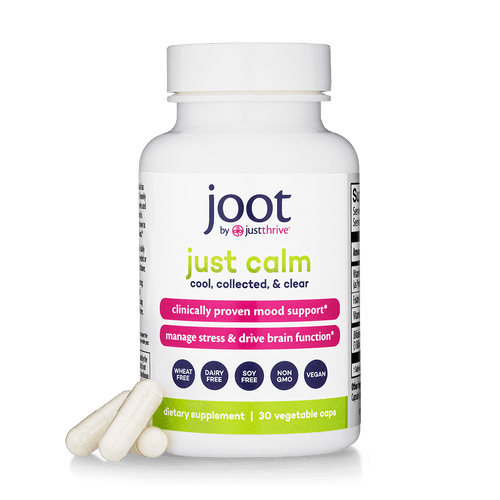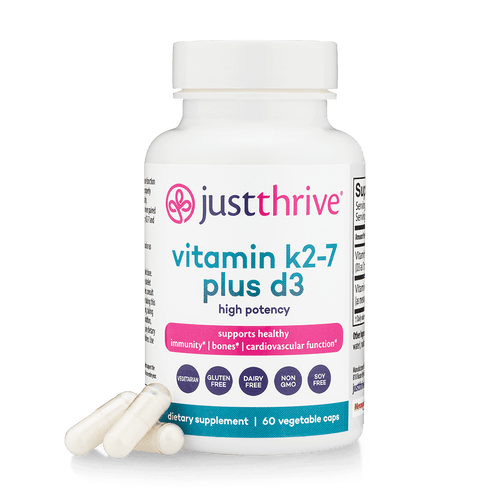Living with depression makes everything seem harder. It drains the joy out of activities you used to love, and can leave you feeling tired, hopeless, sad, and achy.
Perhaps you’ve tried to self-diagnose and analyze your life to see what set your mood off course. But think back to the last time you were sick… with a cold, a virus, or a bacterial infection. Because it’s possible—likely even—that an infectious disease triggered this depression.
Over the past few years, researchers have been shocked to see the direct connection from viral or bacterial infections to major depression. And here’s what the research has shown…
Infectious disease and its treatments can easily knock your gut microbiome—the trillions of bacteria in your gut—out of balance, a condition called dysbiosis. Gut imbalances have been clearly identified as key causes of mental health problems like depression and anxiety.[1]
But that’s actually good news. Because balancing your gut and nurturing a thriving population of probiotic bacteria can help support your emotional well-being.[2]
The Disease-Dysbiosis Connection
It’s no surprise that depression rates have spiked since the pandemic. Most doctors chalk that up to isolation, fear of infection, and loneliness.[3] They’re not wrong… but they’re not 100% right either. Surprising research tells a different story, one that acts like a gut punch.
Turns out that viral infections can cause disturbances in the gut microbiome and trigger full-blown dysbiosis.[4,5] In dysbiosis, harmful pathogenic bacteria vastly outnumber beneficial probiotic bacteria.
Bacterial infections cause the same effect.[6] And this imbalance gets compounded by use of antibiotics that can wipe out beneficial probiotic bacteria but leave resistant pathogens to grow and spread.[7]
So no matter what you’ve been sick with, from the sniffles to strep throat to the flu, chances are it caused dysbiosis… and that triggered your depression.


Dysbiosis Causes Depression
Your brain and your gut are directly linked by a pathway called the gut-brain axis (GBA). This two-way communication plays a major role in your nervous system, and it strongly affects your mental and emotional health.[8]
In a healthy gut microbiome, there are trillions of diverse probiotic bacteria that produce mood-soothing compounds which promote positive emotions. These beneficial bacteria also create nutrients and chemicals that protect your brain and your nervous system:
- Butyrate, a short chain fatty acid (SCFA) that sparks positive moods and improves quality of life[9]
- Propionate, another SCFA that’s associated with the brain’s reward system and promotes a sense of calm[10]
- GABA (gamma-aminobutyric acid), a calming brain chemical that soothes anxiety and helps control depression[11]
- Serotonin, a “feel good” neurotransmitter that naturally reduces symptoms of depression and helps you feel focused and happy[12]
But when your gut is in a state of dysbiosis, production of these mood-boosting compounds drops off sharply.[13] That’s because pathogens don’t produce helpful chemicals for your brain… Instead, they crowd out the beneficial bacteria that do. And research shows that people with major depressive disorder have lower levels of the probiotic bacteria that produce SCFA[14] and GABA[15] in their gut microbiomes.
How to Overcome Dysbiosis
One of the fastest and most clinically proven ways to defeat dysbiosis is by choosing and using a high quality spore probiotic that can arrive in your gut 100% alive and ready to work.
Spore probiotics quickly promote balance in your gut microbiome by:
- Producing defensive compounds that push back against pathogenic bacteria[16]
- Helping a diverse population of beneficial bacteria grow and flourish[17]
- Producing antioxidants that fight free radicals and keep healthy cells healthy[18]
And when your gut microbiome returns to a state of healthy equilibrium, it can get back to producing the SCFAs and neurotransmitters that help keep your mood on the bright side.

The “Psychobiotic” Boost – New Bacteria That Can Support Your Mental Health
Beneficial bacteria contribute to positive moods and clear thinking.[19] And amongst a new class of mood influencing probiotics known as “psychobiotics,” there’s one unique strain that stands above the rest for its ability to keep your mind calm and focused: Bifidobacterium longum 1714™ (B. longum 1714™).[20]
Studies show that this B. longum 1714™ helps promote positive moods in 3 key ways:
- Calms negative emotions and reduces nervous brain activity in people dealing with social stress[21]
- Boosts learning, memory, and focus during times of stress[22]
- Improves sleep quality[23]
This level of targeted support helps balance your mood and quiet stress signals so you can remain cool, collected, and in control.
Keep Your Gut and Your Mood Healthy with Just Thrive
A well-balanced gut microbiome supported by clinically proven spore probiotics encourages positive mood and steady mental health. And targeted “psychobiotics” go a step further to keep you feeling happy, calm, and focused.
Just Thrive Probiotic & Antioxidant contains four deeply-researched, scientifically verified spore probiotics shown to maintain a diverse population of beneficial gut bacteria:
- Bacillus subtilis HU58™
- Bacillus indicus HU36™
- Bacillus coagulans
- Bacillus clausii
These powerful probiotic strains promote a well-balanced gut microbiome. Plus, Just Thrive Probiotic is the ONLY retail-available probiotic AND antioxidant. That’s because of the proprietary Bacillus indicus HU36™, which is proven to turn your gut into an antioxidant factory by producng antioxidants at the site of peak absorption for unmatched digestive, immune, and total-body health support.
Just Calm contains “psychobiotic” Bifidobacterium longum 1714™ for targeted mood support along with three essential B vitamins—B6, B9, and B12—that work together to support GABA production and help your body mount healthy stress responses.
With the Dynamic Duo bundle, you can give your mood double support and SAVE on Just Thrive Probiotic & Antioxidant and Just Calm.
>> Tap here to add this uplifting dream team to your daily routine today.
And if you’re nervous about trying Just Thrive Probiotic & Antioxidant and Just Calm? We’ve got your back.
EVERY Just Thrive purchase is covered by our Bottom of the Bottle, 100% money back guarantee.
That means you can test out the Dynamic Duo bundle to see how well it works for you… and if for any reason you don’t feel a difference, you can ask for a full product refund at any time. Even if it’s 3 months or 3 years later. Even if the bottles are empty!
Sources:
- Sonali S, et al. Mechanistic Insights into the Link between Gut Dysbiosis and Major Depression: An Extensive Review. Cells. 2022 Apr 16;11(8):1362.
- Liu L, Wang H, Chen X, Zhang Y, Zhang H, Xie P. Gut microbiota and its metabolites in depression: from pathogenesis to treatment. EBioMedicine. 2023 Apr;90:104527.
- Renaud-Charest O, Lui LMW, Eskander S, Ceban F, Ho R, Di Vincenzo JD, Rosenblat JD, Lee Y, Subramaniapillai M, McIntyre RS. Onset and frequency of depression in post-COVID-19 syndrome: A systematic review. J Psychiatr Res. 2021 Dec;144:129-137. doi: 10.1016/j.jpsychires.2021.09.054. Epub 2021 Sep 30. PMID: 34619491; PMCID: PMC8482840.
- Morse ZJ, Horwitz MS. Virus Infection Is an Instigator of Intestinal Dysbiosis Leading to Type 1 Diabetes. Front Immunol. 2021 Oct 15;12:751337. doi: 10.3389/fimmu.2021.751337. PMID: 34721424; PMCID: PMC8554326.
- Ferreira-Junior AS, et al. Detection of Intestinal Dysbiosis in Post-COVID-19 Patients One to Eight Months after Acute Disease Resolution. Int J Environ Res Public Health. 2022 Aug 17;19(16):10189.
- Hrncir T. Gut Microbiota Dysbiosis: Triggers, Consequences, Diagnostic and Therapeutic Options. Microorganisms. 2022 Mar 7;10(3):578. doi: 10.3390/microorganisms10030578. PMID: 35336153; PMCID: PMC8954387.
- Zhang S, Chen DC. Facing a new challenge: the adverse effects of antibiotics on gut microbiota and host immunity. Chin Med J (Engl). 2019 May 20;132(10):1135-1138. doi: 10.1097/CM9.0000000000000245. PMID: 30973451; PMCID: PMC6511407.
- Clapp M, Aurora N, Herrera L, Bhatia M, Wilen E, Wakefield S. Gut microbiota's effect on mental health: The gut-brain axis. Clin Pract. 2017 Sep 15;7(4):987. doi: 10.4081/cp.2017.987. PMID: 29071061; PMCID: PMC5641835.
- Caspani G, Kennedy S, Foster JA, Swann J. Gut microbial metabolites in depression: understanding the biochemical mechanisms. Microb Cell. 2019 Sep 27;6(10):454-481. doi: 10.15698/mic2019.10.693. PMID: 31646148; PMCID: PMC6780009.
- Modesto Lowe V, Chaplin M, Sgambato D. Major depressive disorder and the gut microbiome: what is the link? Gen Psychiatr. 2023 Feb 17;36(1):e100973. doi: 10.1136/gpsych-2022-100973. PMID: 36844965; PMCID: PMC9943825.
- Luscher B, Shen Q, Sahir N. The GABAergic deficit hypothesis of major depressive disorder. Mol Psychiatry. 2011 Apr;16(4):383-406. doi: 10.1038/mp.2010.120. Epub 2010 Nov 16. PMID: 21079608; PMCID: PMC3412149.
- Jenkins TA, Nguyen JC, Polglaze KE, Bertrand PP. Influence of Tryptophan and Serotonin on Mood and Cognition with a Possible Role of the Gut-Brain Axis. Nutrients. 2016 Jan 20;8(1):56. doi: 10.3390/nu8010056. PMID: 26805875; PMCID: PMC4728667.
- Moles L, Delgado S, Gorostidi-Aicua M, Sepúlveda L, Alberro A, Iparraguirre L, Suárez JA, Romarate L, Arruti M, Muñoz-Culla M, Castillo-Triviño T, Otaegui D; international Multiple Sclerosis Microbiome Study Consortium. Microbial dysbiosis and lack of SCFA production in a Spanish cohort of patients with multiple sclerosis. Front Immunol. 2022 Oct 17;13:960761. doi: 10.3389/fimmu.2022.960761. PMID: 36325343; PMCID: PMC9620961.
- Huang Y, Shi X, Li Z, Shen Y, Shi X, Wang L, Li G, Yuan Y, Wang J, Zhang Y, Zhao L, Zhang M, Kang Y, Liang Y. Possible association of Firmicutes in the gut microbiota of patients with major depressive disorder. Neuropsychiatr Dis Treat. 2018 Dec 3;14:3329-3337. doi: 10.2147/NDT.S188340. PMID: 30584306; PMCID: PMC6284853.
- Strandwitz P, Kim KH, Terekhova D, Liu JK, Sharma A, Levering J, McDonald D, Dietrich D, Ramadhar TR, Lekbua A, Mroue N, Liston C, Stewart EJ, Dubin MJ, Zengler K, Knight R, Gilbert JA, Clardy J, Lewis K. GABA-modulating bacteria of the human gut microbiota. Nat Microbiol. 2019 Mar;4(3):396-403. doi: 10.1038/s41564-018-0307-3. Epub 2018 Dec 10. PMID: 30531975; PMCID: PMC6384127.>
- Stein T. Bacillus subtilis antibiotics: structures, syntheses and specific functions. Mol Microbiol. 2005 May;56(4):845-57. doi: 10.1111/j.1365-2958.2005.04587.x. PMID: 15853875.
- Marzorati M, Van den Abbeele P, Bubeck S, Bayne T, Krishnan K, Young A. Treatment with a spore-based probiotic containing five strains of Bacillus induced changes in the metabolic activity and community composition of the gut microbiota in a SHIME® model of the human gastrointestinal system. Food Res Int. 2021 Nov;149:110676. doi: 10.1016/j.foodres.2021.110676. Epub 2021 Aug 30. PMID: 34600678.
- Crescenzo R, Mazzoli A, Cancelliere R, Bucci A, Naclerio G, Baccigalupi L, Cutting SM, Ricca E, Iossa S. Beneficial effects of carotenoid-producing cells of Bacillus indicus HU16 in a rat model of diet-induced metabolic syndrome. Benef Microbes. 2017 Oct 13;8(5):823-831. doi: 10.3920/BM2017.0025. Epub 2017 Oct 3. PMID: 28969443.
- Ansari F, Pourjafar H, Tabrizi A, Homayouni A. The Effects of Probiotics and Prebiotics on Mental Disorders: A Review on Depression, Anxiety, Alzheimer, and Autism Spectrum Disorders. Curr Pharm Biotechnol. 2020;21(7):555-565. doi: 10.2174/1389201021666200107113812. PMID: 31914909.
- Allen, A., Hutch, W., Borre, Y. et al. Bifidobacterium longum 1714 as a translational psychobiotic: modulation of stress, electrophysiology and neurocognition in healthy volunteers. Transl Psychiatry 6, e939 (2016).>https://doi.org/10.1038/tp.2016.191
- Wang H, Braun C, Murphy EF, Enck P. Bifidobacterium longum 1714™ Strain Modulates Brain Activity of Healthy Volunteers During Social Stress. Am J Gastroenterol. 2019 Jul;114(7):1152-1162. doi: 10.14309/ajg.0000000000000203. PMID: 30998517; PMCID: PMC6615936.
- Savignac HM, Tramullas M, Kiely B, Dinan TG, Cryan JF. Bifidobacteria modulate cognitive processes in an anxious mouse strain. Behav Brain Res. 2015;287:59-72. doi: 10.1016/j.bbr.2015.02.044. Epub 2015 Mar 17. PMID: 25794930.
- Moloney GM, Long-Smith CM, Murphy A, Dorland D, Hojabri SF, Ramirez LO, Marin DC, Bastiaanssen TFS, Cusack AM, Berding K, Fouhy F, Allen AP, Stanton C, Clarke G, Dinan TG, Cryan JF. Improvements in sleep indices during exam stress due to consumption of a Bifidobacterium longum. Brain Behav Immun Health. 2020 Nov 13;10:100174. doi: 10.1016/j.bbih.2020.100174. PMID: 34589719; PMCID: PMC8474585.














